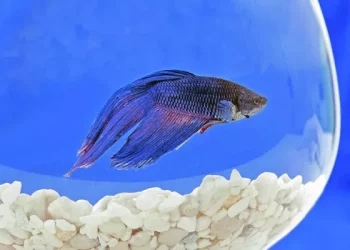When it comes to owning a pet, betta fish often swim to the top of the list. Their vibrant colors, flowing fins, and feisty personalities make them a popular choice for aquarists. However, many new betta owners wonder: Do betta fish need light all the time? The answer, as you might guess, is not as straightforward as a simple “yes” or “no.” So, grab a comfy chair and settle in as we dive deep into the world of betta fish, light, and the aquatic life they lead.
Understanding Betta Fish Basics
Before we plunge into the lighting conundrum, let’s take a moment to appreciate our finned friends. Betta fish, also known as Siamese fighting fish, hail from the warm waters of Southeast Asia. They thrive in shallow ponds, rice paddies, and slow-moving streams. These water bodies often have plenty of vegetation, providing shelter and hiding spots. With their long fins and striking colors, bettas are not only beautiful but also exhibit unique behaviors that can entertain and educate us.
Betta fish are also known for their territorial nature. Male bettas are particularly infamous for their aggressive behavior, often fighting to the death if placed together. This leads to a common misconception that all bettas are aggressive. While males tend to be more feisty, females can also exhibit territorial behavior, especially if they feel their space is being invaded. Understanding these characteristics is crucial for proper betta care, including their lighting needs.
The Role of Light in a Betta’s Life
Light plays a critical role in the life of betta fish, just as it does for humans and other animals. It influences their behavior, mood, and overall well-being. However, not all light is created equal.
Natural Light vs. Artificial Light
In their natural habitat, bettas experience a cycle of day and night. The sun rises and sets, creating a rhythm that dictates their behavior. This natural light cycle helps regulate their biological clock, also known as circadian rhythms.
Natural light provides a gentle and dynamic spectrum that changes throughout the day. Artificial light, on the other hand, can often be too harsh or static. While it is possible to replicate natural light using specialized aquarium lighting, many aquarium owners rely on standard fluorescent or LED lights, which may not adequately simulate the natural environment of their fish.
Benefits of Adequate Lighting
Providing the right lighting for your betta can lead to several benefits:
Enhanced Colors: Proper lighting can bring out the vivid colors of your betta fish, making them appear even more stunning.
Plant Growth: If you have live plants in your aquarium, they require light for photosynthesis. Healthy plants provide shelter and improve water quality.
Behavior Regulation: Light affects the activity levels of bettas. During the day, they tend to be more active, while nighttime often prompts rest.
Risks of Excessive Lighting
While light is essential, too much of it can lead to problems:
Stress: Constant bright light can stress betta fish, leading to behavioral issues or even health problems.
Algae Growth: Overexposure to light can promote unwanted algae growth, turning your beautiful tank into a green mess.
Sleep Disruption: Just like humans, betta fish need their beauty sleep. Too much light can disrupt their natural resting periods.
How Much Light Do Betta Fish Need?
So, how much light do these colorful fish really need? The general recommendation is to provide 8 to 12 hours of light per day. This mimics their natural environment, allowing them to experience a day-night cycle that promotes their well-being.
Tips for Managing Light
To keep your betta fish happy and healthy, here are some tips for managing their lighting needs:
Use a Timer: Setting a timer for your aquarium lights can help ensure a consistent light cycle. This way, your betta can anticipate when it’s time to rest.
Choose the Right Spectrum: Look for LED lights that offer a full spectrum of light. This not only enhances colors but also supports plant growth.
Avoid Direct Sunlight: While natural light is beneficial, direct sunlight can lead to temperature fluctuations and algae growth. Place your tank in a location that receives indirect sunlight.
See Also: Can You Feed Betta Fry Frozen Brine Shrimp?
Observe Behavior: Keep an eye on your betta’s behavior. If they seem stressed or are hiding more than usual, consider adjusting the lighting conditions.
Create Hiding Spots: Incorporate plants and decorations in the tank. These can provide shade and places for your betta to retreat when they need a break from the light.
The Importance of Darkness
As much as light is essential, darkness is equally important for betta fish. The absence of light allows them to rest and recuperate. Just as humans feel tired after a long day, fish need their downtime, too.
The Resting Period
During their resting period, bettas lower their activity levels, conserving energy. This is also when they perform essential bodily functions. Without sufficient darkness, bettas may experience stress and health issues, such as weakened immune systems.
Finding the Balance
The key to a healthy betta life is balance. Just like you wouldn’t want to live in a room that’s always lit up, your betta doesn’t want to be in a tank with constant light. Maintaining a cycle of light and darkness not only promotes their well-being but also mimics their natural habitat.
Common Myths About Betta Fish and Light
With so much information available, it’s easy to get caught up in misconceptions. Here are some common myths about betta fish and light:
Myth: Betta Fish Need Constant Light
Fact: As previously mentioned, bettas need a light-dark cycle to thrive. Constant light can lead to stress and health issues.
Myth: More Light Equals Happier Betta
Fact: Too much light can have the opposite effect. Bettas prefer moderate light levels.
Myth: All Aquarium Lights Are the Same
Fact: Different lights have different spectrums and intensities. Choosing the right light can make a significant difference in your betta’s health.
Myth: Bettas Don’t Benefit from Plants
Fact: Live plants can enhance your betta’s environment, providing hiding spots and improving water quality.
Myth: Bettas Don’t Need Special Care
Fact: Like all pets, bettas require specific care, including proper lighting, temperature, and tank conditions.
Conclusion
In conclusion, betta fish do not need light all the time. While they thrive in environments that provide adequate lighting during the day, they also require periods of darkness for rest and recovery. Understanding their natural behaviors and needs is key to keeping them happy and healthy.
Related Topics:



























